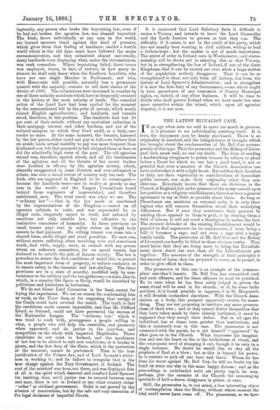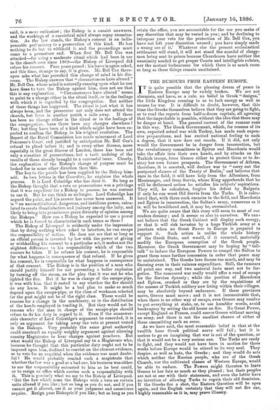THE LATEST RITUALIST CASE.
JN an age when men are said to move too much in grooves, it is pleasant to see individuality asserting itself. It is true, the enjoyment may be dearly purchased. There is an originality in mischief, and the independence of thought which has brought about the condemnation of Mr. Bell Cox savours greatly of this type. That the prosecutor and the Bishop of Liver- pool both mean well, no one can doubt. The duty of sending a hardworking clergyman to prison because he refuses to plead before a Court for which no one has a good word, is not so grateful that even a member of the Church Association can have undertaken it with a light heart. But neither their devotion to duty, nor their superiority to considerations of immediate public interest, can make their originality other than mis- chievous. Everybody knows that there are divisions in the Church of England,but under pressure of the recent assault upon her position as a religious establishment, there has been a general agreement to say as little as possible about them. As long as Churchmen can maintain an external unity, it is only theo- logians who will concern themselves about their underlying differences. But if once they accentuate their quarrels by sending those opposed to them to gaol, or by denying them a field of labour, it will not need a theologian to notice the fact. The stoutest defender of the existing Establishment would be puzzled to find arguments for its continuance, if from being a fold it becomes a cage, and not even a cage with a happy family inside. The prosecutor of Mr. Bell Cox and the Bishop of Liverpool can hardly be blind to these obvious truths. They must know that they arc doing more to bring the Establish- ment down about our ears than all the Liberationists put together. The measure of the strength of their principles is the amount of harm they are prepared to cause, or to permit, in order to give effect to them.
The prosecutor in this ease is an example of the common- place one-idea'd fanatic. Mr. Bell Cox has committed such and such offences, and for these offences he must be punished. To be sure, when he has been safely lodged in prison the same ritual will be used in his church ; or if, by some lucky accident, it is found possible to suppress it in St. Margaret's. it will flourish unchecked elsewhere. With the Church Asso- ciation as a body, this prospect apparently counts for some- thing. They are not proposing to institute any more prosecu- tions of their own ; and as they cannot flatter themselves that they have taken much by those already instituted, it must be supposed that they accept their defeat. But in all ages the individual has at times been greater than institutions, and this is eminently true in this case. The prosecutor is not connected with the parish, he is not himself "aggrieved" by what goes on in the Church. What impresses his imagina- tion and sets his heart on fire is the wickedness of ritual, and the consequent need of stamping it out, though it -be only in ea single instance. No doubt be would like to slay all the prophets of Baal at a blow ; but as this is beyond his power, he is content to pick off one here and there. When he has done his worst against Mr. Bell Cox, he will no doubt try his hand on some one else in the same happy diocese ; and as the proceedings in undefended suits are pretty rapid, he may, perhaps, give the enemies of the Church the encouraging spectacle of half-a-dozen clergymen in prison at once.
Still, the prosecutor is, to our mind, a less interesting object of contemplation than the Bishop, without whose consent the trial could never have come off. The prosecutor, as we have
said, is a mere enthusiast ; the Bishop is a casuist unawares, and the workings of a casuistical mind always repay examina- tion. As the law stands, the Bishop's consent is an indis- pensable preliminary to a prosecution of this kind. He has nothing to do but to withhold it, and the proceedings must come to a premature end. When first Mr. Bell Cox was attacked—for using a moderate ritual which had been in use in the church ever since 1869—the Bishop of Liverpool did
refuse his consent. Four years passed ; his leave is again asked, and this time, strange to say, it is given. Mr. Bell Cox there- upon asks what has provoked this change of mind in his dio-
cesan. The Bishop answers that "circumstances have altered." Mr. Bell Oox, whose mind is naturally running upon what he can have done t3 turn the Bishop against him, does not see that this is any explanation. "Circumstances have altered" seems to point to a change either in the ritual itself, or in the feelings with which it is regarded by the congregation. But neither of these things has happened. The ritual is just what it has always been, and the prosecutor not only does not attend the church, but lives in another parish a mile away. If there has been no change either in the ritual or in the feelings of the congregation, have there been any changes elsewhere ? Yes; but they have been of a kind which might have been ex- pected to confirm the Bishop in his original resolution. The Report of the Royal Commission has made mincemeat of Lord Penzance's Court, and justified by anticipation Mr. Bell Cox's refusal to plead before it; and in every other diocese, more especially in the great diocese of London, there has been not only a cessation of prosecutions, but a tacit undoing of the results of those already brought to a successful issue. Clearly, the explanation of the Bishop's change of purpose must be looked for in some other direction than this.
The key to the puzzle has been supplied by the Bishop him- self. In two letters in the Guardian, he explains the whole process. It is Lord Coleridge who has done it. So long as the Bishop thought that a veto on prosecutions was a privilege that it was expedient for a Bishop to possess, he was content to use it. But he can think so no longer. Lord Coleridge has argued the point, and his answer has never been answered. It is "an unconstitutional, dangerous, and invidious power, calcu- lated to create dissatisfaction and jealousy among the laity, and likely to bring into prominence grave diversity of opinion among the Bishops." How can a Bishop be expected to use a power which he is forced to characterise in such terms as these ?
The Bishop of Liverpool is evidently under the impression that by doing nothing when asked to interfere, he can escape the responsibility of action. He does not see that so long as an official person is invested by law with the power of giving or withholding his consent to a particular act, it makes not the slightest difference to his responsibility which of the two courses he takes. If he refuses his consent, he is responsible for what happens in consequence of that refusal. If he gives his consent, he is responsible for what happens in consequence of that consent. The Bishop is in the position of a man who should justify himself for not preventing a boiler explosion by turning off the steam, on the plea that it was not he who lighted the fire. But if he was in charge of the escape-pipe, it was with him that it rested to say whether the fire should do any harm. It might be a bad plan to make so much depend upon the escape-pipe, or the class of workman selected for the post might not be of the right class. These would be reasons for a change in the machinery, or in the distribution of the hands employed in tending it. But they would not be reasons why the man in charge of the escape-pipe should refuse to do his duty in regard to it. Even if the unanswer- able character of Lord Coleridge's argument be conceded, it is only an argument for taking away the veto at present vested in the Bishops. Very probably the same great authority could construct an equally weighty argument against allowing country Magistrates to hear charges against poachers. But what would the Bishop of Liverpool say to a Magistrate who, because he thought that this particular duty ought not to be imposed upon him, declined to convict on the clearest evidence, or to vote for an acquittal when the evidence was most doubt- ful? He would probably remind such a magistrate that whether the law was a good or a bad one, his business was either to use the responsibility entrusted to him as he best could, or to resign an office which carries such a responsibility with it. This is precisely what we say to the Bishop of Liverpool.
Get the law which arms the Bishops with a veto on certain suits altered if you like ; but so long as you do not, and if you cannot get at altered, use it as your judgment and conscience require. Resign your Bishopric if you like ; but so long as you retain the office, you are accountable for the use you make of any discretion that may be vested in you ; and by declining to interpose your veto for the protection of Mr. Bell Cox, you have not left your discretion unused ; you have simply made a wrong use of it.' Whatever else the present ecclesiastical settlement will stand, it will not stand the scandal of clergy- men being sent to prison because Churchmen have neither the unanimity needed to get proper Courts and intelligible rubrics, nor the mutual forbearance for which there is so much room so long as these things remain unattained.



































 Previous page
Previous page